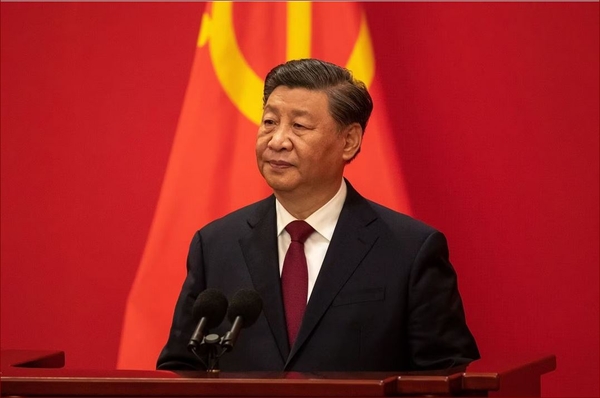 The dictatorship headed by Xi Jinping is the bloodiest in recorded history. |
"A GAFFE," the Washington journalist Michael Kinsley once wrote, "is when a politician tells the truth — some obvious truth he isn't supposed to say."
At a fundraiser last week, President Biden committed such a "Kinsley gaffe" while speaking about his administration's efforts to improve relations with Beijing. The reason why Chinese ruler Xi Jinping "got very upset" when that spy balloon full of electronic equipment was shot down by a US Air Force jet in February, the president said, "is he didn't know it was there." That, he added, is "a great embarrassment for dictators."
The description of Xi as a "dictator" — apparently the first time a sitting US president has used that term about a Chinese ruler — provoked an immediate blast from Beijing. The foreign ministry called Biden's words "extremely absurd," "irresponsible," and "a blatant political provocation." US Ambassador Nicholas Burns was summoned to receive an official reprimand.
At times Biden's aides have rushed to walk back some of his more unexpected remarks, but there was none of that this time. "I don't think that the president's comments need to be clarified any further," State Department spokesman Vedant Patel said when asked about Beijing's fuming reaction.
Nor was there any flak from the Republican side of the aisle.
"Biden is right — Xi is a dictator, and we should treat him as such," House Foreign Relations Committee Chairman Mike McCaul, a Texas Republican, told NBC News. Senator Dan Sullivan of Alaska agreed. "Despite recent protests from the Chinese Communist Party, President Biden got it right," he tweeted. "Xi is a dictator."
Of course he is, and it is good that Biden says so.
Too often US presidents have been tongue-tied by the villainous reality of China's totalitarian regime. During the vast pro-democracy uprising in China in 1989, President George H.W. Bush refused to speak up for the brave protesters. "I would encourage restraint," he said. "I think this, perhaps, is a time for caution." When a million people surged into Hong Kong's streets in 2019, desperate to save their autonomy from the crackdown ordered by Xi, then-president Donald Trump offered them no support, either. He said only that he was sure China and Hong Kong "will be able to work it out" and emphasized that Xi was "a friend of mine."
It is far better for American presidents to tell the truth about America's adversaries than to engage in such toadying or mealy-mouthed appeasement. And the truth about the regime that has ruled China ever since Mao Zedong seized power in 1949 is that it has murdered, enslaved, and oppressed more human beings than any government in history.
Xi presides over a dictatorship that makes systematic use of slave labor and torture, that mercilessly persecutes religious minorities, that engages in the ghastly practice of harvesting vital organs from Falun Gong practitioners and other dissenters, and that imprisons between 1 million and 3 million Uighur Muslims in concentration camps. Its absolute control is reinforced by an Orwellian system of high-tech surveillance designed to suppress any whisper of thoughtcrime or opposition. It is a literally genocidal regime that constantly threatens to plunge East Asia into war in order to conquer its democratic island neighbor, Taiwan.
China is a dictatorship in every sense of the word. The ultimate goal of US policy should not be to coexist with that dictatorship but to change it. And a key lesson from the defeat of the last totalitarian communist regime — the Soviet Union — is that it is crucial for American leaders to speak frankly about the nature of evil empires.
The thugs who rule in Beijing might find it embarrassing to be described in the West as a "dictatorship." Yet within their own domain they embrace the D-word and always have.
The constitution of the Chinese Communist Party — amended recently to enable Xi to rule for life — explicitly declares that the party's overriding functions are "to uphold the people's democratic dictatorship" and to "oppose bourgeois liberalization." The embrace of dictatorship dates back to Mao, who delivered a landmark speech titled "On the People's Democratic Dictatorship" in 1949, as he was poised for victory in China's Civil War.
The new communist regime, Mao promised, would impose a "dictatorship over the running dogs of imperialism." It would ruthlessly "suppress them" — "if they speak or act in an unruly way, they will be promptly stopped and punished." The government would deploy a "powerful state apparatus," he said, to ensure the "oppression of antagonistic classes."
Mao kept his vow. The dictatorship he launched — the dictatorship headed by Xi today — is the bloodiest in history. As a practical matter, the United States and other free nations have to deal with China's government. But that is no reason for them to avoid labeling it with accuracy. Biden did so last week. He should do so again, soon.
(Jeff Jacoby is a columnist for The Boston Globe).
-- ## --
Follow Jeff Jacoby on Twitter.
Discuss his columns on Facebook.
Want to read more? Sign up for "Arguable," Jeff Jacoby's free weekly email newsletter.

